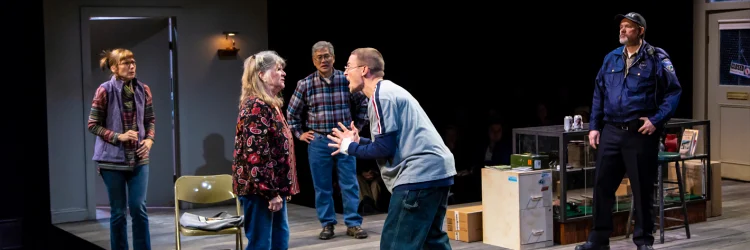Review of Greater Clements at Lincoln Center Theater
What in tarnation is going on here? Why the sudden glut of plays that are three hours long? Have all the dramaturges traded in their shingles for a "Gone Fishin'" sign? Three hours is just too damn long - The Ferryman is an exception. Greater Clements has now joined the three hour club, and for no good reason unless exposition and obfuscation are your preferred delivery formats for the theatre.
Let's start with the good news. Samuel D. Hunter has created a character, Joe, who is unstable in the extreme. Hunter treads a very fine line so skillfully that we are able to walk around inside Joe's head and view the wreckage. This is due in no small part to the artistry of Edmund Donovan as Joe. His dueling/dancing partner is the extraordinary Judith Ivey who, as Joe's mother Maggie, places us outside looking in at Joe and makes us feel the helplessness that consumes her.
Place these two in an Idaho town that is dying because the mine on which it depended is dead, and you have a sad tale of the highest order. The town, Clements, is not only dying - it is disappearing entirely. Proposition 42 was voted on, and a majority of the people voted to disband the town. Mostly this was in reaction to the rich folks from California who moved in, set up shop in their McMansions and outlawed the unsuitable habits that the locals have had for years. One being their right to have the messiest goldarn yards you ever did see. The rich versus poor conflict combined with an unstable man about town is epic, and would have been enough for a play of say, a couple of hours.
Mr. Hunter, however, decided to introduce a long lost love into the mix in the form of Billy (Ken Narasaki) who brings a small dash of romance as well as the subject of Japanese Americans in internment camps during WWII. Mr. Narasaki's performance does not stand up against the expansive Ivey and his contribution, along with that of his petulant granddaughter Cal, adds nothing except time to this story.
The tale is really centered around Joe, but the script wanders off to other pastures over and over again. The simplicity and danger are lost until the last moments of the play. Even then the playwright does not let it rest and adds two more scenes that try the soul.
Judith Ivey and Edmund Donovan shine mightily. But the minutes drag nonetheless. Defeat snatched from the jaws of victory, indeed.
(Photo by T. Charles Erickson)
WHAT THE OTHER CRITICS SAID
"Perhaps "Greater Clements" isn't too long but too short: It might be better off as a mini-series, where its net of ideas could unwind more naturally. As a play, though, it's like that mine elevator: creaky and skeletal but with intermittent access to wonderful things. "
Jesse Green for New York Times
"There's not a false note in the ensemble's performances, building on the playwright's insightful observation of ordinary lives. But it's the towering work of Ivey and Donovan — the latter already a quiet revelation in Clarkston — that gives the production such rewarding dimensions."
David Rooney for Hollywood Reporter
"Hunter's version of the American Dream is lyrical in so many of the right places, but not boldly so. If only all of "Greater Clements" were as wiry as Ivey and Donovan's performances."
A. D. Amorosi for Variety
Originally published on
